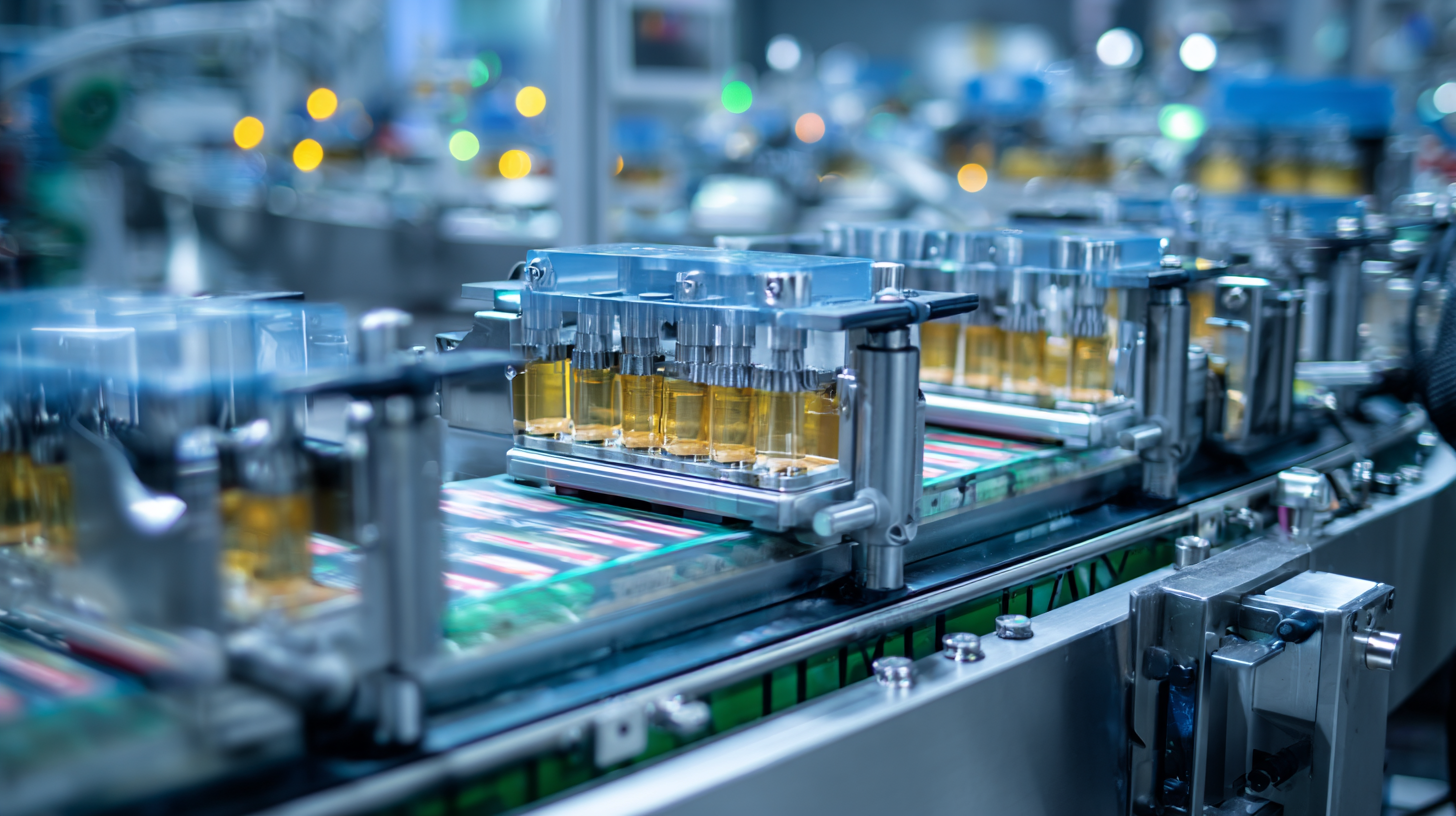
Blog
How the Best Tablets Press Machine is Shaping the 2025 Industry Tech Landscape
As the demand for high-quality pharmaceutical and nutraceutical products continues to surge, the role of advanced manufacturing equipment is becoming increasingly critical. In 2023, the global tablet press market was valued at approximately $2.1 billion, with projections suggesting it will reach $3.5 billion by 2025, driven by innovations in technology and rising production needs.
 At the heart of this transformation is the Tablets Press Machine, which plays a pivotal role in ensuring efficiency, precision, and scalability in tablet production. This blog will explore how to find quality suppliers and highlight top strategies for integrating these machines into production lines, thus shaping the industry's tech landscape for the future.
With the right approach, manufacturers can optimize their processes and meet the evolving standards of quality and performance demanded by the market.
At the heart of this transformation is the Tablets Press Machine, which plays a pivotal role in ensuring efficiency, precision, and scalability in tablet production. This blog will explore how to find quality suppliers and highlight top strategies for integrating these machines into production lines, thus shaping the industry's tech landscape for the future.
With the right approach, manufacturers can optimize their processes and meet the evolving standards of quality and performance demanded by the market.
The Evolution of Tablet Press Technology and Its Impact on the Industry
The evolution of tablet press technology has significantly transformed the pharmaceutical and manufacturing sectors, propelling them into a new era of efficiency and precision. As industries strive for higher production rates and quality assurance, modern tablet presses have integrated advanced automation and real-time monitoring systems. These innovations not only streamline production processes but also minimize human error, ensuring that every tablet meets strict quality standards. The result is a marked improvement in the reliability of dosage forms, greatly benefiting both manufacturers and consumers.
Moreover, the impact of tablet press technology stretches beyond mere production enhancements; it also paves the way for customization and flexibility. The introduction of modular designs allows manufacturers to easily adapt their equipment for varying batch sizes and formulations, catering to the specific needs of diverse markets. This flexibility is particularly vital as consumer demand shifts towards personalized medicine and tailor-made pharmaceutical solutions. As we look towards 2025, it is clear that the continuous development of tablet press technology will play a crucial role in shaping the industry's landscape, driving innovation and setting new standards for quality and performance.
Key Features of the Best Tablets Press Machine Revolutionizing Production
The evolution of tablet press machines is significantly influencing the manufacturing landscape for 2025, introducing advanced features that enhance production efficiency and product quality. One of the standout features is the integration of smart technology, allowing for real-time monitoring and adjustments during the production process. This not only minimizes errors but also maximizes output consistency, ensuring that each tablet produced meets the highest standards of quality. Additionally, the incorporation of Artificial Intelligence (AI) helps in predictive maintenance, reducing downtime and operational costs.
Another key innovation is the development of user-friendly interfaces that simplify operation for technicians and operators. By employing touchscreen controls and automated settings, these machines enable faster training and reduce the likelihood of human error. Moreover, the versatility of these tablet press machines allows them to accommodate a wider range of formulations, catering to different industries, from pharmaceuticals to nutraceuticals. As these technological advancements continue to shape the production landscape, companies that adopt these innovative tablet press machines will undoubtedly gain a competitive edge in the market.
Key Features of the Best Tablets Press Machine Revolutionizing Production
How Tablet Press Machines are Enhancing Efficiency in Manufacturing
In today’s rapidly evolving manufacturing landscape, tablet press machines are revolutionizing efficiency and productivity. These machines not only streamline the production process but also ensure a higher level of precision in tablet formulation. The ability to automate processes reduces human error and accelerates output significantly, allowing manufacturers to meet increasing demand without compromising quality.
**Tip 1:** Regular maintenance checks are essential to ensure optimal performance of your tablet press machines. This includes inspecting the die and punch components for wear and tear, as a well-maintained machine operates more efficiently and has a longer lifespan.
Moreover, advancements in technology have enabled tablet press machines to incorporate smart features such as real-time monitoring and data analytics. This leads to better decision-making and problem-solving, as manufacturers can quickly identify bottlenecks or inefficiencies in the production line.
**Tip 2:** Implementing training sessions for staff on the latest tablet press technology can enhance overall operational efficiency. Well-informed operators not only run machines more effectively but also contribute to minimizing downtime and improving product quality.
As the industry continues to integrate these innovations, the role of tablet press machines will undoubtedly grow in importance, driving the future of manufacturing forward.
How the Best Tablets Press Machine is Shaping the 2025 Industry Tech Landscape
| Feature | 2023 Data | 2025 Projected | Impact on Efficiency |
|---|---|---|---|
| Production Speed (Tablets/hour) | 500 | 800 | 60% increase |
| Energy Efficiency (kWh/1000 tablets) | 20 | 15 | 25% decrease |
| Waste Reduction (%) | 10 | 5 | 50% reduction |
| Automation Level (%) | 70 | 90 | Increased efficiency |
| Labor Costs (% of Total Production) | 30 | 20 | Significant savings |
The Role of Automation in Modern Tablet Press Machines
The integration of automation into modern tablet press machines is revolutionizing the pharmaceutical and nutraceutical industries. By employing advanced technologies, these machines are capable of producing tablets with unprecedented precision and speed. Automation not only minimizes human error but also enhances operational efficiency, allowing companies to meet increasing market demands without compromising on quality. With automated processes, manufacturers can achieve higher consistency in tablet weight and density, which are crucial factors for dosage accuracy.
Furthermore, automation contributes significantly to cost reduction in production. With less manual intervention required, labor costs diminish while production lines can operate around the clock. The introduction of smart technologies, including IoT-enabled devices, allows for real-time monitoring and data analysis, facilitating predictive maintenance and reducing downtime. As we look toward 2025, the evolution of tablet press machines towards fully automated systems will likely set new standards in production capabilities and operational paradigms, ultimately shaping the future of the industry.

Future Trends: What to Expect in Tablet Press Machinery by 2025
As we look ahead to 2025, the tablet press machinery industry is poised for significant evolution driven by technological advancements and changing market demands. One of the most notable trends is the integration of artificial intelligence and machine learning in the manufacturing process. These technologies will enable operators to collect and analyze data in real-time, optimizing production efficiency and ensuring consistent quality in tablet formulation. Companies are expected to invest in smart machinery that can self-adjust based on real-time feedback, enhancing both output and precision.

Another anticipated trend is the shift towards sustainability. As industries grapple with environmental concerns, tablet press machinery is evolving to use more eco-friendly materials and processes. Innovations such as energy-efficient designs and recycling initiatives may become standard practice in 2025. Additionally, manufacturers will likely adopt practices that reduce waste and minimize the carbon footprint of production processes, aligning with global sustainability goals. The combination of technology and environmental responsibility will not only reshape the industry but also redefine the standards for quality and efficiency in tablet production.



